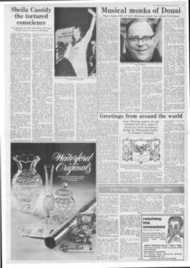Page 3, 30th November 1984
Page 3

Report an error
Noticed an error on this page?If you've noticed an error in this article please click here to report it.
Tags
Share
Related articles
Church Calls For 'urgent' Action On Warnock
Warnock Report Raises Abortion Law Dilemma
Hostile Reception Awaits Warnock
Lady Warnock Demands "real Deterrent" In Law.
Bishops Support Embryology Bill
A matter of life and death
Jonathan Petre on Catholic reaction to the Warnock Report, now before Parliament.
FOR THE Catholic Church, the Warnock Committee's report on human fertilisation and embryology is a matter of life and death.
That, anyway, is the level of seriousness at which the issues thrown up by the report are being approched by the English and Welsh bishops, and it goes some way to explaining their reluctance to speak out prematurely.
At the end of their recent national conference, however, they provided us with a glimpse of their thinking in a statement outlining the forthcoming response to the Warnock Report by the Department of Social Responsibility, expected out any day. In it the bishops affirmed their fundamental moral position with uncompromising clarity.
Echoing Catholic theolOgy down the ages, they said "God is the ultimate giver of life and human agencies have no arbitrary mandate to dispose of that life."
They went on to stress the dangers of the Warnock Report if its recommendations are not modified. "The issues discussed in the Warnock Report are basic to the sanctity of life. No civilised community can ignore threats to the quality of human life and human life itself."
This unequivocal stance will not gain general support from all sections of society. Yet, despite enormous pressure from doctors and other influential groups, Parliament is nowhere near establishing a consensus on the use of human embryos for the purpose of medical research.
It was this issue which caused the most difficulty for the Warnock Committee. The majority recommended a compromise solution, that experimentation should be permissable on embryos up to 14 days old, and that embryos could be fertilised in the test-tube specifically for this purpose. Only three of the 16-member Committee, one of whom, Professor John Marshall of the Institute of Nearology in London, was the only Catholic on the Committee, dissented.
The three who signed the minority report called for a blanket ban on all experimentation on embryos for whatever cause, arguing that there could exist no circumstances in which such experimentation could be justified.
The bishops, however, despite their hard-line stance on the killing of embryos, appear to have taken a more subtle position than the dissenting Committee members. This position, while rejecting Warnock, allows for the possibility in "exceptional" cases of some form of "experimentation" on embryos.
The majority position of the Warnock Committee stems from their view of the embryo and their conclusion that the key question "When does human life begin?" is, for practical purposes, unanswerable. Their solution is to take, somewhat arbitrarily as they themselves admit, several significant physical developments which occur in the womb 14 days after conception as the point when an embryo is transformed from a mere "collection of cells" to a human being with "special status" under the taw.
But, say the bishops, human life does not suddently and arbitrarily emerge in an embryo. That embryo is a person in potency from the moment of conception, and should be accorded that status in law. It is possessed of God-given and sacrosact life from the first,-and to kill an embryo, for whatever purpose, is tantamount to murder.
Even if the embryo is not to be disgarded after the doctors have finished their research on it, say the bishops, its rights as a person are being abused unless the experimentation is beneficial to that individual embryo. "Respect 'must always be paid to the human embryo. The destruction of a human embryo, even as a part of an otherwise acceptable medical process, is the killing of .a human life."
In the type of "exceptional" situation envisaged by the bishops, a surgeon could perform "experimental" surgery on an embryo, either to save its life or to rectify a genetic disorder at an early stage. Medical advances are liekly to make the possibility of doctors being able to correct malformations in embryos a reality within a few years.
This provision is the lynch-pin of the positive aspect of the bishops' case — the encouragement of "therapeutic practices whkh respect embryonic human life".
This, together with their desire to encourage "all reasonable scientific processes which assist married couples to have children", opens the way for the bishops to approve of "simple cases" of in vitro fertilisation.
IVF has for some time been a highly controversial issue within the Catholic Church. Although a number of moral theologians have endorsed it, their views are considered to be somewhat in advance of official teaching.
The implantation of an embryo in a womb after fertilisation in a test-tube in the laboratory has been condemned for involving two elements which have always been disapproved by the Church, namely masturbation and the artificial insemination of humans. A theologian writing in L'Osservatore Romano, the official Vatican weekly newspaper, early this year, told infertile couples that "not everything one desires is right and not even scientific progress makes it so. What matters most is not that a child is obtained, but that it is obtained in a human manner."
The Bishops of England and Wales, however, appear to have overcome these objections, but details of their argument will not be known until the full response is published.
The "simple case" of IVF referred to by the bishops is where the gametes (both sperm and egg) are obtained from the husband and wife respectively and not from a third party (or "donor"). Fertilisation then takes place in vitro, and after a few days development the fertilised egg is transferred to the mother's womb for a normal pregnancy and birth.
The bishops argue that it is essential, for both moral and medical reasons, to prevent a third party becoming involved in the process. They made this position clear in their statement: "In decisions concerning new human life, support must be given to marriage and family life. The introduction of third parties through the donation of human egg or sperm is an unacceptable intrusion into married life."
The House of Commons last week debated the Warnock Report for the first time. Whatever the final outcome of the Parliamentary process, any input by the bishops is to be welcomed as a sane and responsible contribution to the debate.
blog comments powered by Disqus













